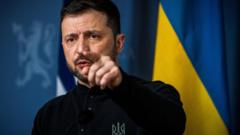With peace talks on the horizon, Ukrainian President Volodymyr Zelensky has urged Russia to drop unreasonable demands that prolong the ongoing conflict.
Zelensky Urges Russia to Abandon 'Unreasonable' Terms Before Peace Negotiations

Zelensky Urges Russia to Abandon 'Unreasonable' Terms Before Peace Negotiations
Ukrainian President Volodymyr Zelensky has called on Russia to withdraw its 'unnecessary' demands as upcoming peace talks approach.
Zelensky's remarks come in the lead-up to significant peace negotiations scheduled for next Monday in Saudi Arabia, where both Ukrainian and U.S. officials will participate. He emphasized that Russian President Vladimir Putin should cease his 'unnecessary demands' which include a total cessation of military aid to Ukraine. The Ukrainian president expressed concerns that conceding NATO membership as a negotiating point would be a significant concession to Russia.
The forthcoming talks follow a lengthy period of conflict, and the U.S. is actively working towards a ceasefire between the two nations after three years of fighting. Although a general agreement for a ceasefire has been acknowledged by both leaders in previous conversations, details remain unresolved due to diverging stances.
Zelensky pointed out that a Ukrainian delegation would present the U.S. with critical infrastructure lists for protection during the discussions, indicating a need for clear agreements on what should be safeguarded from Russian assaults. He categorically rejected suggestions that Ukraine might cede control of its nuclear power plants to the U.S., clarifying that such plants rightfully belong to Ukraine.
The issue of territory, particularly regarding Crimea, which Russia annexed in 2014, was also a focal point of Zelensky's comments. He firmly stated that Crimea remains 'an integral part' of Ukraine, dismissing any suggestion of territorial concessions.
Zelensky called for a multi-faceted ceasefire involving land and sea to effectively counter Russian aggression, reflecting a cautious approach toward peace negotiations. As the conflict continues to escalate, highlighted by recent strikes causing casualties in Ukraine, Zelensky reiterated the crucial need for ongoing military aid from European allies, particularly emphasizing an urgent need for artillery financing.
British Prime Minister Sir Keir Starmer has also advocated for extensive planning for a post-war Ukraine, supporting a coalition approach to assure peace once an agreement is reached, involving contributions from over 30 countries, spearheaded by the U.K. and France. As discussions about the future of Ukraine unfold, leaders across Europe are assessing their defense strategies amidst an uncertain global landscape.
The forthcoming talks follow a lengthy period of conflict, and the U.S. is actively working towards a ceasefire between the two nations after three years of fighting. Although a general agreement for a ceasefire has been acknowledged by both leaders in previous conversations, details remain unresolved due to diverging stances.
Zelensky pointed out that a Ukrainian delegation would present the U.S. with critical infrastructure lists for protection during the discussions, indicating a need for clear agreements on what should be safeguarded from Russian assaults. He categorically rejected suggestions that Ukraine might cede control of its nuclear power plants to the U.S., clarifying that such plants rightfully belong to Ukraine.
The issue of territory, particularly regarding Crimea, which Russia annexed in 2014, was also a focal point of Zelensky's comments. He firmly stated that Crimea remains 'an integral part' of Ukraine, dismissing any suggestion of territorial concessions.
Zelensky called for a multi-faceted ceasefire involving land and sea to effectively counter Russian aggression, reflecting a cautious approach toward peace negotiations. As the conflict continues to escalate, highlighted by recent strikes causing casualties in Ukraine, Zelensky reiterated the crucial need for ongoing military aid from European allies, particularly emphasizing an urgent need for artillery financing.
British Prime Minister Sir Keir Starmer has also advocated for extensive planning for a post-war Ukraine, supporting a coalition approach to assure peace once an agreement is reached, involving contributions from over 30 countries, spearheaded by the U.K. and France. As discussions about the future of Ukraine unfold, leaders across Europe are assessing their defense strategies amidst an uncertain global landscape.



















